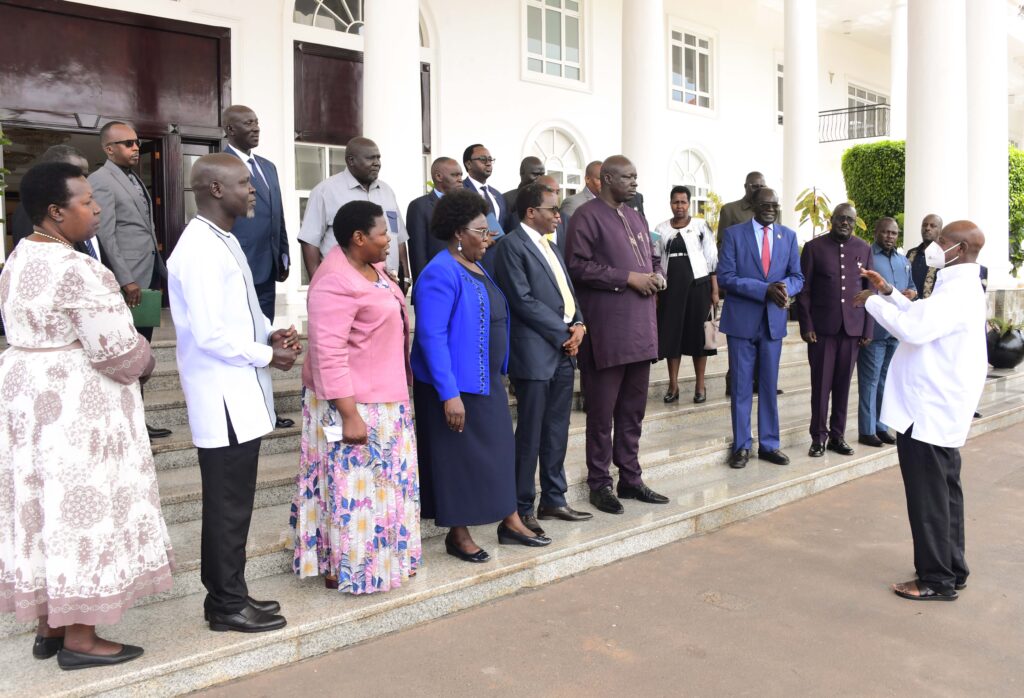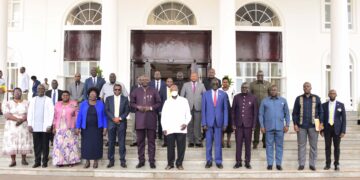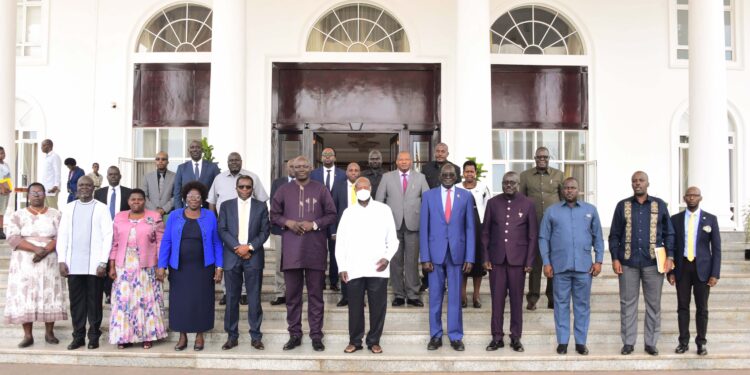President Yoweri Kaguta Museveni met with opposition leaders from Acholi, marking a significant step toward unity and collaboration. Both sides agreed to set aside political differences and work together to tackle poverty and drive socio-economic transformation in the sub-region.
The meeting, held at State House, Entebbe, brought together Members of Parliament from various political affiliations who expressed their commitment to partnering with the government for the development of Acholi.
President Museveni reflected on Uganda’s history, emphasising that unity and a shared vision are essential for sustainable progress.
Tracing the country’s political challenges back to 1961, the President noted that Uganda’s instability stemmed from early political mistakes, particularly the Uganda People’s Congress (UPC) misleading the Buganda Kingdom with promises that encouraged tribal politics instead of national unity.
He compared Uganda’s history with Tanzania’s, highlighting how Tanzania’s foundation in unity helped it achieve stability, while Uganda’s divided beginnings fueled conflicts.
“The first mistake was made in 1961 when UPC misled Mengo by promising federalism rather than a united Uganda,” Museveni stated. He recalled how the collapse of the UPC-Kabaka Yekka alliance in 1966 deepened divisions and weakened the army, allowing further instability.
The President also dismissed claims that his past ties with Acholi fighters should have automatically led to the region’s development. He explained how sectarianism disrupted unity efforts, citing an instance in 1976 when he trained Acholi youth in Mozambique, but some abandoned the cause after being influenced by tribal sentiments.
Museveni emphasised the importance of reconciliation over revenge, citing how the fall of Idi Amin in 1979 led to the unfair targeting of West Nile communities, forcing over half a million people into exile. He urged leaders to focus on national unity rather than past grievances.
On development, Museveni reiterated the government’s focus on poverty eradication through the Parish Development Model (PDM). However, he acknowledged that funding large parishes with Shs 100 million was insufficient and suggested revisiting the funding strategy to reflect the varying sizes of parishes.
Education was also a key topic, with the President advocating for affordable schooling by establishing seed secondary schools in every sub-county.
He argued that expanding day schools would improve access and reduce dropout rates. He reaffirmed the government’s commitment to Universal Primary and Secondary Education, including increasing capitation grants.
Regarding healthcare, Museveni stressed the need for preventive measures such as immunisation, proper nutrition, and clean water access. “Curative health is expensive. If we focus on prevention, we can eliminate 80% of illnesses,” he stated.
Reflecting on Uganda’s military strength, Museveni credited their success to sacrifice rather than high salaries. He recalled how during the fight against Amin, Tanzanian leader Julius Nyerere provided guns and food but no money, prioritizing national security over financial rewards.
The opposition leaders, led by Hon. Okin Ojara, MP for Chua West County, expressed their commitment to working with the government for Acholi’s development. They have formed a platform, ‘Operation Harmony,’ comprising 10 opposition MPs dedicated to unity and progress.
“We asked ourselves: Should we remain in opposition while our people suffer? How long must Acholi remain one of the poorest regions? We realised engagement with the government was the best path,” Hon. Ojara said.
The leaders also called for a robust Transitional Justice Framework to address the psychological scars from past conflicts. They proposed establishing a Mental Rehabilitation Center in Acholi, using the currently broken-down facility at Gulu Regional Hospital.

Concerns about war compensation were raised, with calls for transparency in the process. “We need clarity on compensation—who has received it, how much has been spent, and the timeline,” Ojara stated.
He also highlighted the plight of Acholi refugees still living in Zambia, DRC, and Kenya, urging government intervention to facilitate their return.
The memorandum also proposed upgrading Kitgum General Hospital to a Regional Referral Hospital and establishing new hospitals in Omoro and Amuru districts. Infrastructure rehabilitation, particularly roads, was another priority to improve access to services and markets.
The MPs endorsed ‘Musevenomics,’ the President’s economic strategy, and recommended its application in Acholi through commercial farming focused on coffee, cocoa, and fruit production. They also praised the Gulu Presidential Skilling Hub but requested additional centres to expand youth empowerment programmes.
Given Acholi’s vast size, the MPs urged the government to increase PDM funding for larger parishes to make the program more impactful.
Hon. Hillary Onek, Minister for Relief, Disaster Preparedness, and Refugees, supported the call for unity among Acholi leaders. “We must put political differences aside and work with the government to develop Acholi,” he said.
Hon. Betty Aol Ocan, MP for Gulu City, echoed the need for unity in tackling poverty, stating that political affiliations should not hinder progress. “If we all prioritize the interests of the Acholi people, why shouldn’t we work together?” she said.
The meeting was also attended by several government officials, including Dr. Kenneth Omona, Minister of State for Northern Uganda, Gen. David Muhoozi, Minister of State for Internal Affairs, and senior NRM officials.
This engagement marks a new chapter in Acholi’s development journey, with opposition leaders and the government uniting for a common cause—lifting the sub-region out of poverty and ensuring sustainable growth.









